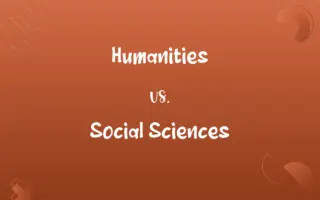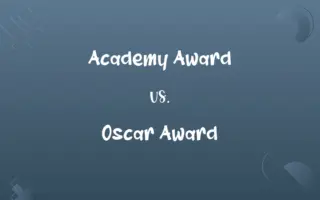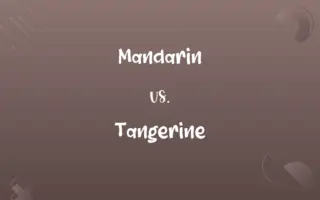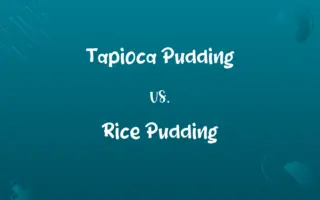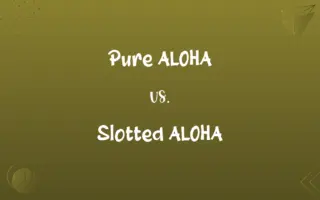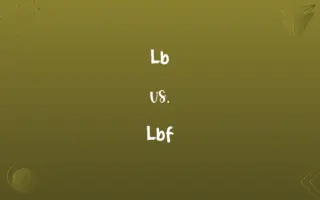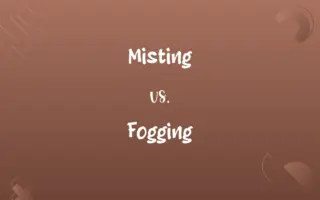Dictatorship vs. Monarchy: Know the Difference

By Shumaila Saeed || Published on February 5, 2024
Dictatorship is rule by a single leader with absolute power, often undemocratically acquired, while monarchy is governance by a royal family, usually inherited.
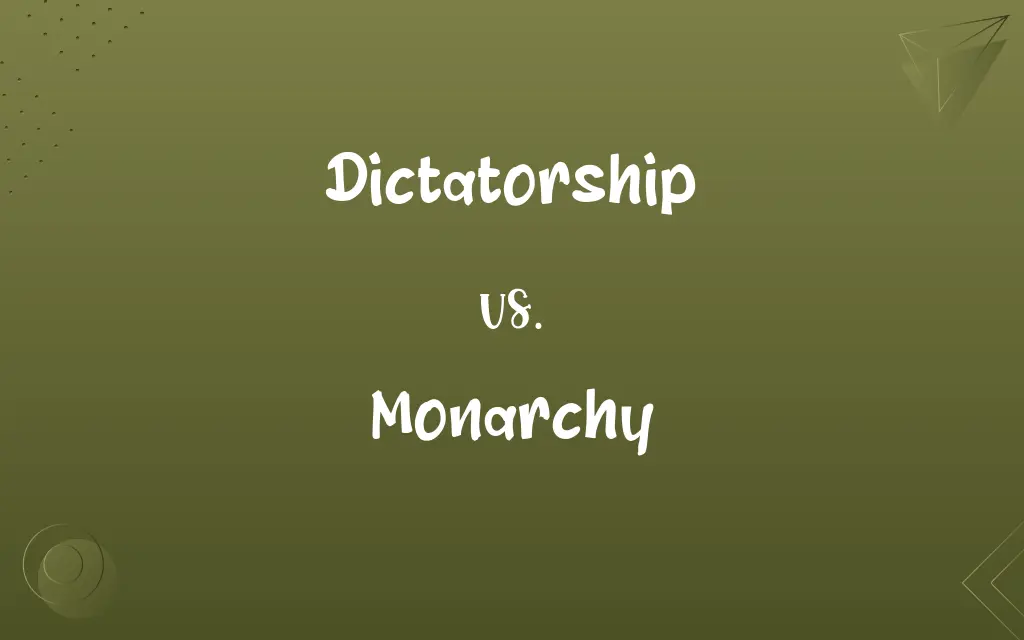
Key Differences
Dictatorship is characterized by a single leader's absolute control, often gaining power through non-democratic means. In contrast, monarchy involves a system of governance led by a royal family, with succession usually determined by heredity.
Shumaila Saeed
Feb 05, 2024
In a dictatorship, power is often maintained through force, censorship, and suppression of opposition. Monarchies, however, may have symbolic roles with limited or ceremonial powers in modern constitutional monarchies.
Shumaila Saeed
Feb 05, 2024
Dictators often emerge during crises, exploiting situations to seize control. Monarchs usually come to power through established lines of succession, often seen as a continuation of tradition and history.
Shumaila Saeed
Feb 05, 2024
The leadership in a dictatorship can change unpredictably, depending on the dictator's hold on power. Monarchy, conversely, tends to have a more stable line of succession, often viewed as a stable symbol of national identity.
Shumaila Saeed
Feb 05, 2024
Dictatorships may claim to represent the people, but they rarely allow free elections or opposition. Monarchies can vary, with some modern ones upholding democratic principles and functioning within a constitutional framework.
Shumaila Saeed
Feb 05, 2024
ADVERTISEMENT
Comparison Chart
Power Acquisition
Often undemocratically, through force or crisis.
Typically inherited within a royal family.
Shumaila Saeed
Feb 05, 2024
Governance Style
Absolute control by a single leader.
Can range from absolute to ceremonial roles.
Shumaila Saeed
Feb 05, 2024
Maintenance of Power
Through force, censorship, and suppression.
Through tradition, often with legal frameworks.
Shumaila Saeed
Feb 05, 2024
Succession
Unpredictable, dependent on leader's control.
Predetermined, based on hereditary lines.
Shumaila Saeed
Feb 05, 2024
Relationship with Democracy
Rarely democratic, often suppresses opposition.
Varies, some exist within democratic systems.
Shumaila Saeed
Feb 05, 2024
ADVERTISEMENT
Dictatorship and Monarchy Definitions
Dictatorship
A dictatorship is absolute rule by one person.
The dictatorship suppressed all political opposition.
Shumaila Saeed
Jan 18, 2024
Monarchy
It is often hereditary.
The monarchy passed from generation to generation.
Shumaila Saeed
Jan 18, 2024
Dictatorship
It often arises in times of crisis.
The country fell into a dictatorship after the coup.
Shumaila Saeed
Jan 18, 2024
Monarchy
Monarchies can be constitutional or absolute.
The constitutional monarchy balanced tradition with democracy.
Shumaila Saeed
Jan 18, 2024
Dictatorship
Dictatorships usually lack free elections.
In the dictatorship, elections were a mere formality.
Shumaila Saeed
Jan 18, 2024
ADVERTISEMENT
Monarchy
A monarchy is rule by a king or queen.
The monarchy was a symbol of national heritage.
Shumaila Saeed
Jan 18, 2024
Dictatorship
They often use propaganda and censorship.
The dictatorship controlled all media outlets.
Shumaila Saeed
Jan 18, 2024
Monarchy
They often have ceremonial roles.
In modern times, the monarchy served mostly ceremonial purposes.
Shumaila Saeed
Jan 18, 2024
Dictatorship
Dictators may rule through fear and oppression.
The dictatorship maintained power through fear.
Shumaila Saeed
Jan 18, 2024
Monarchy
Monarchies embody historical tradition.
The monarchy represented centuries of history.
Shumaila Saeed
Jan 18, 2024
Monarchy
A government in which sovereignty is embodied within a single, today usually hereditary head of state (whether as a figurehead or as a powerful ruler).
An absolute monarchy is a monarchy where the monarch is legally the ultimate authority in all temporal matters.
A constitutional monarchy is a monarchy in which the monarch's power is legally constrained, ranging from where minor concessions have been made to appease certain factions to where the monarch is a figurehead with all real power in the hands of a legislative body.
Shumaila Saeed
Jan 18, 2024
Dictatorship
A type of government where absolute sovereignty is allotted to an individual or a small clique.
Shumaila Saeed
Jan 18, 2024
Monarchy
A form of government where sovereignty is embodied by a single ruler in a state and his high aristocracy representing their separate divided lands within the state and their low aristocracy representing their separate divided fiefs.
Shumaila Saeed
Jan 18, 2024
Dictatorship
Any household, institution, or other organization that is run under such sovereignty or autocracy.
Shumaila Saeed
Jan 18, 2024
Monarchy
States based on a system of governance headed by a king or a queen.
Shumaila Saeed
Jan 18, 2024
Dictatorship
The office, or the term of office, of a dictator; hence, absolute power.
Shumaila Saeed
Jan 18, 2024
Monarchy
A state or government in which the supreme power is lodged in the hands of a monarch.
Shumaila Saeed
Jan 18, 2024
Dictatorship
A form of government in which the ruler is an absolute dictator (not restricted by a constitution or laws or opposition etc.)
Shumaila Saeed
Jan 18, 2024
Monarchy
A system of government in which the chief ruler is a monarch.
In those days he had affected zeal for monarchy.
Shumaila Saeed
Jan 18, 2024
Monarchy
The territory ruled over by a monarch; a kingdom.
What scourage for perjuryCan this dark monarchy afford false Clarence.
Shumaila Saeed
Jan 18, 2024
Monarchy
An autocracy governed by a monarch who usually inherits the authority
Shumaila Saeed
Jan 18, 2024
Repeatedly Asked Queries
Do monarchies always have absolute power?
No, some are constitutional with limited or ceremonial roles.
Shumaila Saeed
Feb 05, 2024
How do dictators come to power?
Often through force, coups, or exploiting crises.
Shumaila Saeed
Feb 05, 2024
Can dictatorships be democratic?
Typically, no; dictatorships suppress democratic processes.
Shumaila Saeed
Feb 05, 2024
What defines a dictatorship?
Absolute rule by an individual, often with oppressive control.
Shumaila Saeed
Feb 05, 2024
Can a dictatorship have a legal framework?
Rarely; they often operate above or outside the law.
Shumaila Saeed
Feb 05, 2024
Do monarchies participate in politics?
In constitutional monarchies, their role is often limited or symbolic.
Shumaila Saeed
Feb 05, 2024
Are all monarchies old-fashioned?
Not necessarily; some have modernized and support democratic principles.
Shumaila Saeed
Feb 05, 2024
How is a new monarch chosen?
Through established hereditary succession lines.
Shumaila Saeed
Feb 05, 2024
How long do dictatorships last?
It varies, depending on the leader's control and opposition.
Shumaila Saeed
Feb 05, 2024
What happens when a dictator dies?
Succession can be unpredictable, sometimes leading to power struggles.
Shumaila Saeed
Feb 05, 2024
Can a monarchy be abolished?
Yes, through revolution, referendum, or legal processes.
Shumaila Saeed
Feb 05, 2024
Do monarchies have any real power?
It varies; some have significant power, while others are mostly ceremonial.
Shumaila Saeed
Feb 05, 2024
What is hereditary monarchy?
A monarchy where power is inherited within a family.
Shumaila Saeed
Feb 05, 2024
Are there democratic monarchies?
Yes, in constitutional monarchies with democratic institutions.
Shumaila Saeed
Feb 05, 2024
Is censorship common in dictatorships?
Yes, censorship and control of information are common tools for maintaining power.
Shumaila Saeed
Feb 05, 2024
How do people oppose dictatorships?
Through protests, resistance movements, or external intervention.
Shumaila Saeed
Feb 05, 2024
Can dictatorships be stable?
They can appear stable but are often vulnerable to internal and external pressures.
Shumaila Saeed
Feb 05, 2024
Do dictatorships have elections?
If they do, such elections are often not free or fair.
Shumaila Saeed
Feb 05, 2024
Can a monarchy coexist with other government forms?
Yes, especially in constitutional monarchies with parliamentary systems.
Shumaila Saeed
Feb 05, 2024
Share this page
Link for your blog / website
HTML
Link to share via messenger
About Author
Written by
Shumaila SaeedShumaila Saeed, an expert content creator with 6 years of experience, specializes in distilling complex topics into easily digestible comparisons, shining a light on the nuances that both inform and educate readers with clarity and accuracy.

